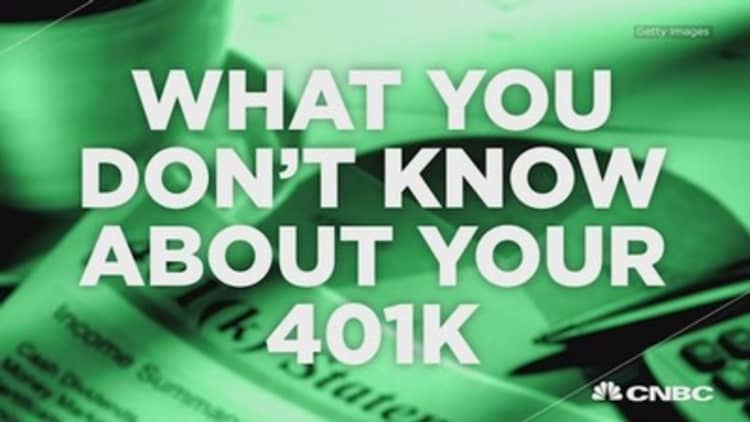


More Americans are saving for retirement, but most are saving less money than they were a year ago.
Fewer than 1 in 5 American workers are saving more for retirement now than they were in 2014, according to a new Bankrate.com survey. What's worse is that 10 percent of people haven't contributed anything to their retirement accounts in the past two years, which was the highest level Bankrate has recorded since it began surveying in 2011.
Not all the survey data were bleak. The percentage of workers saving less for retirement has dropped to 14 percent this year from 18 percent in 2012 and the percentage of people saving more ticked up from 18 percent in 2012 to 19 percent now. Greg McBride, Bankrate's chief financial analyst, attributes the slight increase in the percentage of retirement savers to an improving U.S. economy.
Some employers, particularly larger ones, are looking for ways to cut through the retirement savings apathy. They are automatically enrolling workers into employer-sponsored retirement plans like 401(k)s and gradually increasing employee salary contributions to those plans over time (as long as the workers don't opt out of those features).
"The retirement savings burden has increasingly shifted to workers," McBride said. "Automatic enrollment and automatic escalation are two ways employers can help improve savings rates."
More employers are offering retirement plans with automatic features. The share of employers with retirement plans that automatically enroll participants rose from 57 percent in 2010 to 68 percent last year, according to benefits consultant Towers Watson.
Automatic escalation is less popular, with only 54 percent of employers offering it. However, Tower Watson found that 6 percent of employers that don't have automatic escalation plan to offer it this year and 15 percent are considering it for 2016.
"Automatic enrollment and automatic escalation are powerful tools, but they are not perfect," said Stephen Wendel, head of behavioral science at investment research and management firm Morningstar.
Success depends on how these automatic features are designed, Wendel said. For example, setting a retirement plan's default deferral rate too low can lock workers into savings habits that may not lead to a secure retirement. That's the conclusion investment firm Vanguard reached when it studied the savings behavior of participants in the retirement plans it manages.
Fortunately, employers are recognizing the need for a higher deferral percentage with automatic enrollment.
While a 3 percent deferral rate was the most common default for plans with automatic enrollment, according to accounting firm Deloitte's 2015 benchmarking survey, the percentage of employers offering that deferral rate dropped from 59 percent in 2013 to 47 percent this year. Meanwhile, the percentage of employers offering a 6 percent deferral rate rose from 9 percent in 2013 to 22 percent this year.
Yet automatic escalation has its drawbacks too. "Automatic escalation works great in stable industries where people stay with one company for years," Wendel said. But in industries with high employee turnover, such as retail, the impact of auto escalation on retirement savings is "largely irrelevant," he said.
Even if a retirement plan has auto escalation features, it doesn't mean workers will use them. More than half of retirement plans at large employers offer automatic escalation features, but only 28 percent of employers make it mandatory for employees, according to Towers Watson.
"There are no magic wands," Wendel said. "Employers have different populations of workers and must design retirement plans attuned to their particular needs."




